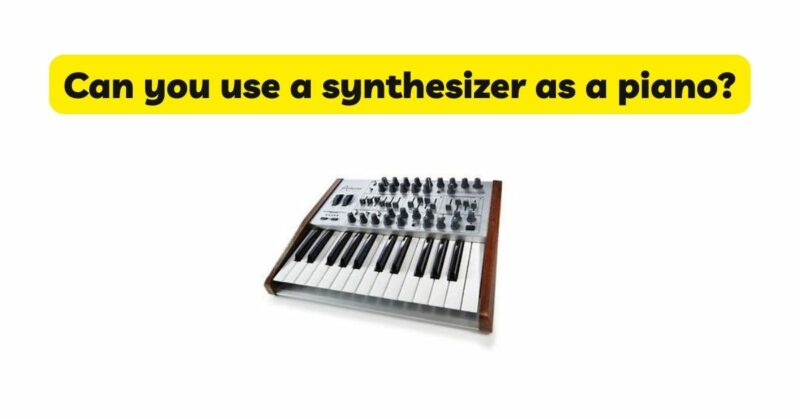Synthesizers have revolutionized the world of music with their versatility, sonic capabilities, and creative potential. While they are often associated with electronic music and sound design, synthesizers can also be used to emulate and replicate the sounds of traditional instruments, including the piano. In this article, we will explore the possibilities and limitations of using a synthesizer as a piano, discussing factors such as sound quality, expressive capabilities, touch sensitivity, and learning experience. By examining these aspects, we aim to shed light on the potential of synthesizers to serve as a piano alternative.
- Sound Quality and Authenticity:
When it comes to replicating the sound of a piano, synthesizers have made significant advancements in recent years. With the development of sophisticated sample-based technology and advanced sound synthesis techniques, synthesizers can now produce piano sounds that closely resemble the timbre and characteristics of an acoustic piano.
However, it is important to note that synthesizers may not match the exact sound quality and authenticity of a dedicated digital piano or an acoustic piano. While they can produce convincing piano tones, they may lack the depth, resonance, and subtle nuances found in a traditional piano. The acoustic nature of a piano, with its complex string vibrations and resonance, creates a unique and organic sound that remains challenging to replicate entirely on a synthesizer.
- Expressive Capabilities and Dynamic Range:
Expressive capabilities and dynamic range are crucial factors in piano playing, allowing musicians to convey emotions and musical nuances. While synthesizers offer various parameters to control the dynamics and expression of piano sounds, they may not fully capture the responsiveness and touch sensitivity of an acoustic piano.
Acoustic pianos respond to the player’s touch, allowing for a wide range of dynamics and tonal variations. The weighted keys and hammer mechanism of a piano provide a tactile feedback that enables musicians to express themselves with precision and subtlety. While some high-end synthesizers incorporate weighted or semi-weighted keys to mimic the piano’s touch, they may not offer the same level of responsiveness and control over dynamics.
- Touch Sensitivity and Playing Experience:
The touch sensitivity of an instrument refers to its ability to respond to the varying degrees of pressure applied to the keys. In a piano, the force with which a key is struck determines the volume and timbre of the sound produced. This touch sensitivity plays a crucial role in piano playing technique and musical expression.
Synthesizers often incorporate touch sensitivity into their keyboards, allowing for variations in volume and dynamics based on key velocity. This feature helps to emulate the piano’s touch to some extent, allowing for expressive playing. However, it is important to note that not all synthesizers have touch-sensitive keys, and the responsiveness may not match the level of control offered by a dedicated digital piano.
- Learning Experience and Technique Development:
The learning experience and technique development can differ when using a synthesizer as a piano. Learning to play the piano involves developing proper hand positioning, finger dexterity, and posture. The weighted keys of a piano help in building finger strength and control, contributing to the development of a solid technique.
When using a synthesizer as a piano, the overall learning experience may vary. While synthesizers can reproduce piano sounds and offer similar keyboard layouts, they may not provide the same tactile feedback and physicality as an acoustic piano. However, synthesizers often come with additional features such as built-in metronomes, recording capabilities, and learning modes that can aid beginners in their learning journey.
- Practicality and Versatility:
Practicality and versatility are important considerations when deciding to use a synthesizer as a piano. Synthesizers, by their nature, offer versatility beyond piano sounds. They provide a vast range of other instrument sounds, effects, and sound design capabilities. This versatility makes them suitable for musicians interested in exploring various genres and experimenting with different sonic possibilities.
Additionally, synthesizers are generally more portable and lightweight compared to traditional pianos, making them practical for gigging musicians or those with limited space. They can be easily transported and integrated into live performances or studio setups. However, it is essential to consider that synthesizers may require additional equipment such as amplification or monitoring systems to achieve the desired sound projection and quality.
Conclusion:
While synthesizers can serve as alternatives to pianos and replicate piano sounds to a certain extent, they may not fully replace the experience and authenticity of a dedicated digital piano or an acoustic piano. The sound quality, expressive capabilities, touch sensitivity, and learning experience of a synthesizer as a piano can differ from the traditional instrument.
Synthesizers offer versatility, sonic exploration, and the potential for creative sound design beyond piano tones. They can be valuable tools for musicians interested in electronic music production, composition, and experimentation. However, for those seeking an authentic piano-playing experience, the piano remains the instrument of choice due to its unique sound characteristics, touch sensitivity, and expressive capabilities.
Ultimately, the decision to use a synthesizer as a piano depends on personal preferences, musical goals, and the desired sound palette. Synthesizers can provide a range of sounds and creative possibilities, while digital pianos or acoustic pianos offer an authentic and immersive piano playing experience. It is beneficial to try out different instruments, consider your specific needs and aspirations, and consult with experienced musicians or music educators to make an informed decision that aligns with your musical journey.


